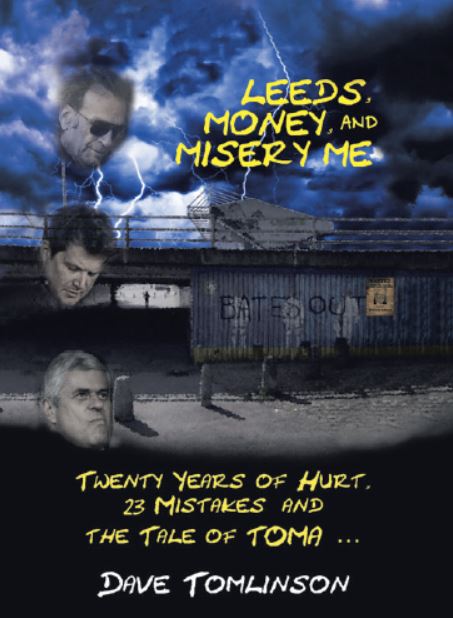 Part 2 Brave new dawn - Results,
table and transfers
Part 2 Brave new dawn - Results,
table and transfers
The Internet and social media have revolutionised the way we live. Now,
if you've got a phone or a tablet and an Internet connection, you have
the power to get your opinions and views out to the entire globe and if
what you say appeals to even tiny niche communities then thousands will
come flocking.
Leeds United is one such community and the storm that hit the social
media through the second half of 2012 provided the strongest evidence
possible.
A few obscure Twitter postings from Sun reporter Andrew Haigh
in May 2012 to the effect that Ken Bates would be out of Leeds United
within weeks and the TOMA (Take Over My A***!) phenomenon was launched.
It became an all-consuming thread on the waccoe.com fans' website,
spawning millions of posts over the next six months, with Gary Cooper,
chairman of Leeds United Supporters' Trust (LUST), making regular contributions
under the nom de plume of BIG (Billy Is God). He clearly knew something
or at least made people think he did and you should have seen the story
mushroom …
United supporters had grown more and more disturbed by the arrogance
and intransigence of Bates and were ready to grasp at any straws that
hinted they would soon be rid of the devil incarnate. The pointed speculation
was the perfect incendiary device and fans seized on it with relish.
Rumours were intense and spread like wildfire across the web with all
sorts of fanciful rumours. If you believed everything, Middle East billionaires,
Ugandan businessmen, American global giants, and even Don Revie's son
Duncan were about to come riding over the hill to rescue Leeds.
There was substance to the rumour, however, and it became so intense
that the United hierarchy felt obliged to issue an official statement
on 29 May, confirming that talks were indeed taking place regarding investment.
Revelations, both true and misleading, continued to leak out throughout
the summer, periodic claims that a takeover was 'imminent' sending fans
into convulsions as waccoe.com threatened to spontaneously combust.
After leading United to a fourteenth-place finish in 2011/12,
Neil Warnock was talking up the need for new blood at Elland Road, following
an announcement that up to 11 players would be moved on during the summer.
Warnock added that he wasn't sure how many incomings there would be as
it depended on how many of the listed players left and for how much. He
had been stung badly the previous season at QPR when few transfers were
completed until late in the summer. 'It was a disaster policy. We suffered
the consequences so I'd like to do business as soon as I can.'
The first man in was centre-back Jason Pearce, signed for a bargain £500,000
from Portsmouth, who had gone into administration in January for the second
time in three seasons. Pompey desperately needed cash and for once United
were the beneficiaries of the financial climate.
Warnock tried to take further advantage by adding Pearce's Fratton Park
colleague Joel Ward, but Leeds missed out with several sources suggesting
the club had struggled to finance a fee of £400,000, setting alarm bells
ringing amid rumours that Leeds were facing another period of financial
trauma. Supporter disquiet welled over; frustrated fans protested that
the feathering of his nest by Bates and the money pouring into the refurbishment
of the East Stand left little to invest in the squad. There were sharp
protests from Bates of a £12 million transfer kitty and being in the division's
top five in terms of spending on players and wages. He used his Yorkshire
Radio mouthpiece to condemn the unreasonable financial expectations of
players, claiming that the agent of one had demanded £15,000 a week, equivalent
to £780,000 a year or nearly £900,000 with taxes for a footballer in the
Championship.
Bates sank his teeth into protestors, claiming that a demonstration by
the supporters at the previous season's opening match against Middlesbrough
had cost the club a £20 million investment, deterring a Leeds-supporting
Saudi businessman with cash in the bank.
Bates was entertaining him in the old West Stand boardroom during the
Boro game. They had a clear view of the fans protesting outside. Seeing
his guest was a little subdued, Bates tried to 'laugh it off and put it
down to youthful exuberance and the disappointment of just missing out
the previous season'.
The chairman thought no more of it and the men parted on good terms but
Bates never heard back from him.
The furious Bates dismissed protesters as morons in his next programme
notes against Hull City, something that went down like a cup of cold sick.
back to top
Fans demonstrated again prior to Brighton in February, arguing about
the lack of investment on the pitch, the reliance on loan players, and
paying Premier League prices to watch poor quality Championship football.
Speculation about the club's finances was stoked up by a searching
and detailed analysis on the Swiss Ramble blog by Kieron O'Connor,
an ex-pat British 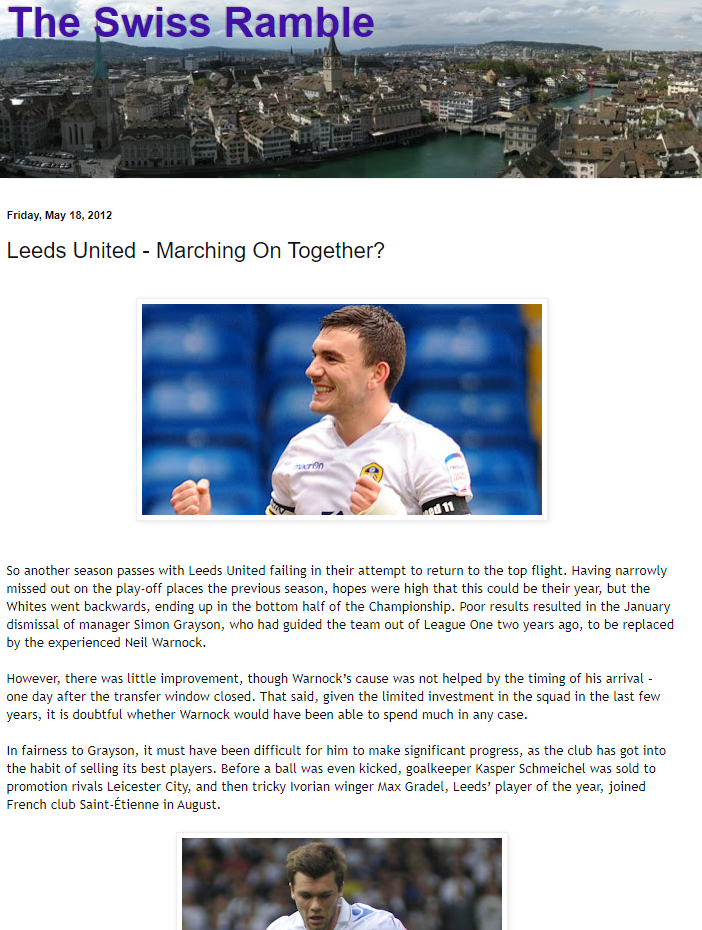 financial
expert living in Switzerland. His musings of 18 May spilled over pages
and pages as he dissected the way that Bates had benefited from the administration
in May 2007 and the CVA that followed.
financial
expert living in Switzerland. His musings of 18 May spilled over pages
and pages as he dissected the way that Bates had benefited from the administration
in May 2007 and the CVA that followed.
He acknowledged the improvement that Bates' prudence was having, although
noting that the recovery was largely due to the administration that had
been employed to clear the debts and allow the club to start afresh. He
went on to analyse United's recent finances, which he described as sound.
Bates had brought financial stability, got a grip on costs, and returned
the club to profitability, albeit with a significant dependence on transfer
income.
The achievement was notable for a Championship club; in 2011 only three
clubs returned a profit, with United's £3.0 million only bettered by Watford
at £9.6 million. Nine clubs lost more than £10 million.
Leeds under Bates were very much an exception to the rule, the only Championship
club to make profits in both 2010 and 2011. They were also exceptional
in terms of revenue. In 2011, £34.5 million was not only the highest turnover
in the division, but £5-£6 million greater than the next three clubs (Burnley,
Middlesbrough, and Hull City), all of whom were boosted by £15 million
in parachute payments following relegation from the Premier League.
On the expenditure front, Bates had brought the paybill down to less
than 50% of turnover, although it rose above 55% in 2012 when income fell.
The balance sheet had been strengthened and debt was under control after
the eye-watering liabilities of the early Millennium, although the improvement
owed much to the write offs forced through by the CVA.
The club was now a net cash generator (£10.1 million in the five years
since administration) and the sum was boosted by player sales (a net £9.5
million over the same period), but £23.3 million had been sunk into building
projects, such as the East Stand, new executive boxes, and lounges. This
revelation bore out Bates' claim that around £20 million had been spent
on 'the clapped out, decaying stadium that I inherited', but gave the
lie to his brash insistence that 'all the money we have received has gone
back into the squad'.
It was obvious, however, that there were emerging issues with cash and
several new sources of funding were agreed between November 2011 and June
2012 to boost liquidity.
Aside from the analysis of the books, Swiss Ramble's real contribution
to the TOMA story came with its comments on United's ability to fund player
wages and transfers. The wage bill, 'a bone of contention for fans', was
low relative to the club's turnover. Since Bates 'rescued' United in 2007,
wages had risen by £3.8 million versus a £9.4 million growth in income.
The football club's wage bill of £16.5 million was twelfth highest among
the Championship clubs and around half QPR's £30 million.
While money was no guarantee of success, said O'Connor, only four clubs
had spent less than Leeds over this period. Bates had never supported
his managers at Elland Road with adequate purchase and pay budgets, his
attitude encapsulated by his comment after dismissing Grayson, 'We are
building a club first and a team second and we are making progress when
so many people are having financial difficulties.' O'Connor felt that
was 'fair enough', though it could also be seen as a false economy to
hold down expenditure and miss out on the riches of the top-flight.
The Swiss Ramble feature sparked the post that launched the TOMA
thread on 23 May 2012, with Paul Grimley quoting several tweets from Sun
reporter Andrew Haigh, saying that there had been £11 million in player
trading over the last year but the club couldn't muster £1 million for
Neil Warnock's 'major surgery' in the summer, that Bates 'won't use his/our
money now' when he wouldn't be here in a month and that there was 'something
in this one', unlike previous rumours.
But what really set the storm off was the words of LUST chairman Gary
Cooper. He said that LUST had been in constructive discussions with several
potential investors over recent months and was very confident of a positive
outcome. He said that he wasn't at liberty to reveal everything he knew
and appealed to fans for patience.
Wait 60 seconds for that comment to 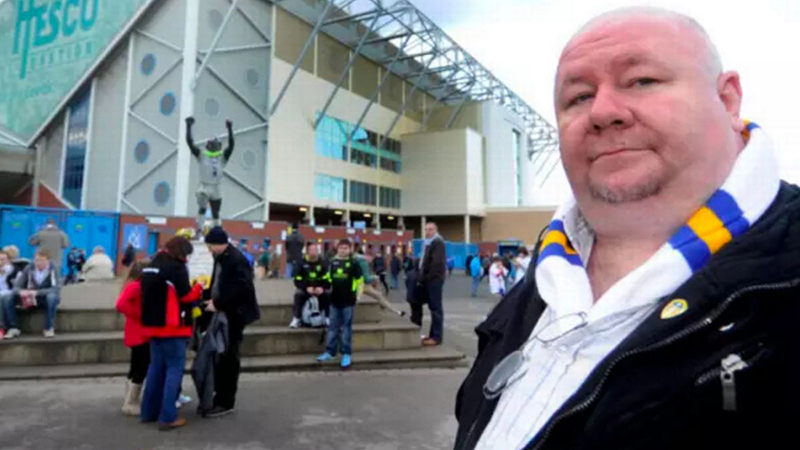 sink
in. And we were away …
sink
in. And we were away …
back to top
Soon there were tens of thousands of posts on the TOMA thread on waccoe.com.
On 28 May, LUST issued another statement, saying that in February it
had asked any potential investors to contact LUST with a view to working
together to buy out Bates. LUST had developed a presentation to demonstrate
to interested parties the benefits of working with it and the Trust had
been in contact with several parties, including two groups who were interested
in buying the club. It could not go into detail for fear of jeopardising
any current negotiations.
Phil Hay of the Yorkshire Evening Post backed the story and the
club felt obliged to issue a formal statement on 28 May, confirming that
talks were taking place. It added that it had always been clear that it
would welcome potential investment but that 'the quality of the investor
is the most important factor in terms of the long-term development of
Leeds United.'
That was enough and we were off with a story that dominated the summer,
with Phil Hay issuing the first details of what was in the air. He reported
that an unconfirmed American group, based in Chicago, was pursuing a major
shareholding in the club and had travelled to England for talks.
He confirmed that Bates was actively seeking investment and that there
had been serious interest from across the Atlantic.
On 26 June, there was another official statement confirming that United
had granted an exclusivity period to enable a potential investor to carry
out due diligence, which it suggested would be a straightforward process.
The club noted that a confidentiality clause prevented it from making
any further comment, but that discussions with the potential investor
had 'left us very comfortable that they have the financial resources to
support the club and that they will have no issues in satisfying the requirements
of the Football League's Owners' and Directors' Test, unlike many of the
previous approaches we have had to endure'.
On 9 August, LUST tweeted out that the deal to buy the club had collapsed
and an unnamed consortium of Middle Eastern businessmen were walking away.
United, however, insisted that things were still on track. A statement
confirmed that the exclusivity period had ended but insisted that the
club was happy to continue discussions. It was not prepared to do so on
an exclusive basis for fear that it would miss out on a better option.
Sheikh Abdulrahman bin Mubarak Al-Khalifa, the man who led a failed takeover
of Leeds United in 2003, was named as a key figure in the Middle Eastern
consortium in July. Reports in the Bahrain media claimed a group of investors,
headed by lifelong United supporter Al-Khalifa, were close to completing
a deal for Leeds. But talks appeared to have stalled and Warnock claimed
that that further new signings were now dependent on raising money from
player sales.
On 25 August, Phil Hay added to the pressure on Bates to sign a deal,
pointing out that it was 88 days since the announcement of investment
talks and 60 since the start of the exclusivity period.  Specialists
saw the delay as exceptionally long, according to Hay, who added that
'this deal has strayed into the realms of the ridiculous and was heading
that way for several weeks, not helped by the confidentiality agreement
which smothers the full story.'
Specialists
saw the delay as exceptionally long, according to Hay, who added that
'this deal has strayed into the realms of the ridiculous and was heading
that way for several weeks, not helped by the confidentiality agreement
which smothers the full story.'
When TOMA fever first took hold, it was rumoured that United's slowness
in the transfer market stemmed from the 'imminent' change of ownership.
It had subsequently become apparent, however, said Hay, 'that Leeds simply
had no money to give Warnock'. Hay concluded, 'This deal should be ratified
without delay, in the best interests of Leeds United.'
LUST tried another tack to bring the negotiations to a conclusion by
launching an advertising campaign on the club's doorstep. The Trust worked
with local company City Ads to find the right location for a poster campaign
and notices were put in place on 15 September.
With a prime position outside the main entrance to the redeveloped East
Stand at Elland Road, the advert was in place initially for a month, with
an option to extend if desired. Fixed to a lamp post directly outside
the main frontage, a day glo poster bore the slogan 'Time for change'
and added, 'Leeds United Supporters' Trust believe our club should match
the ambition of our fans.'
back to top
Three days later, when Leeds hosted Hull City, thousands viewed the poster.
An estimated 300 fans staged a protest against Bates both before and during
the 3-2 defeat, urging him to 'do the decent thing' and sell the club.
Bates used his programme notes to snipe back at LUST, saying that despite
the confidentiality agreement, stories continued to appear 'with varying
degrees of accuracy', including a TV interview which promised that a deal
was 'imminent'. Bates grumbled, 'It wasn't then and is progressing slowly
now', before launching into a diatribe about everybody in football expecting
everything now, while the real world was very different and things were
rarely as urgent for others.
He said that in February, he had agreed to talk to 'another Middle Eastern
party'. In June, when United announced the exclusivity agreement with
another party, 'the first party introduced went bananas. threatening to
report Shaun Harvey to me, the Football League, and (interestingly) to
LUST! They had not taken their interest forward for nearly four months.'
Bates claimed that the appropriate documents had not yet been finalised
between the lawyers.
His comments did not appease the protesters who gathered outside the
entrance to the chairman's new executive box in the East Stand, waving
banners and chanting against him. But appeasement was not his intention.
He had long since abandoned all attempts to influence the 'Morons'.
During the following week it was reported that a second offer of investment
had arisen, also from the Middle East.
Bates had also opened talks with American billionaire Preston Haskell,
a real estate entrepreneur, who would offer major funding to improve the
squad. This proposal had advanced rapidly with Haskell attending the Hull
match, accompanied by legal and business advisers, to discuss the investment
required to deliver promotion.
If either of the new offers were to be accepted, money would have been
made immediately available to strengthen the squad via the 93-day emergency
loan system with a view to permanent January transfers.
It had already been a summer of extensive comings and goings, though
Warnock admitted on Yorkshire Radio that he had to move players out before
he could bring new men to the club.
The potential purchasers of the club had offered the manager some assistance
with cash injections and had sought to persuade Scotland international
Robert Snodgrass not to quit Leeds for Norwich City.
'Snods is a special player,' said Warnock, 'and it's no secret that we've
made him a good offer … He's seen a lot of his teammates depart and I
felt we had to make him a top-rate offer.'
The Scotland international had one year left on his contract and the
deal put on the table would have made him the club's biggest earner but
for him it was all about ambition: his desire to play in the Premiership
and United's readiness to push on for promotion. Snodgrass doubted the
club's ambition, openly breaking ranks when Jonny Howson left for Norwich
in January by saying, 'How can you say you're aiming for promotion and
then sell your captain?' He was now quoted as saying, 'Being captain of
Leeds United in the Premier League would be a dream come true. If anyone
would have said that when I went down there as a 20-year-old, I wouldn't
have believed them, I don't think anyone would have. But I am living in
the real world. We didn't get there. If things change in terms of bringing
players in and getting Premier League class and kicking on, then it's
a no-brainer. You sign the contract and move on.
'The next decision for me is vital. But it's not about me, it's about
my family and making the right decision for them.
'The chairman is trying to put a bit of pressure on me. He's telling
me what plans he has got for the club. But they told me the same type
of plans the season before and it didn't work out. So it's hard to buy
into these things again. I'm captain now, so I should be able to just
sit back and let everything else happen. But it's a wee bit unfortunate
that I'm in this situation. I'll make the right decision when the time
comes.
back to top
'Who knows whether [Warnock] has got one or two years left at Leeds?
If it's one year and I don't sign the contract, then I'll be free next
year. If I do sign, I'd have another year left and be in the same situation
I am in now.
'So it's all right for him to say he could get me a move, but if he leaves,
then the people up above him in the football club are not going to worry
about what he said. My future doesn't lie in the hands of Neil Warnock,
it's in the hands of Robert Snodgrass.'
The winger lost patience with no end in sight to negotiations and left
for Norwich City, joining up with former teammates Howson and Bradley
Johnson. His departure, for a laughable £3 million, was a desperate blow,
cutting Warnock to the quick.
However, the manager hoped to extend the contract of top scorer Ross
McCormack before the season started and ruled out his departure. He was
forced to acknowledge the financial realities and sought to move players
on to free up space on the paybill to bring new men in and admitted he
thought he was 'a couple short'.
Warnock used the Snodgrass money plus the £500,000 received for Adam
Clayton (Huddersfield) and £300,000 for Andy Lonergan (Bolton) to reshape
his squad. He badly needed to recruit with Bruce, Sam, Forssell, Webber,
Taylor, O'Brien, Paynter, Connolly, Rogers, Thompson, and Poleon all leaving
the club, several in loan deals.
Warnock followed the purchase of Jason Pearce by adding defenders Adam
Drury and Lee Peltier, goalkeepers Paddy Kenny and Jamie Ashdown, midfielders
Paul Green, David Norris, Rudy Austin, and Michael Tonge, and forwards
Andy Gray (returning after 14 years), Luke Varney, and El-Hadji Diouf
to the squad. He also benefited from the considerable potential of 18-year-old
Academy product Sam Byram after blooding him on the opening day.
Byram's big moment came against Wolves at Elland Road, the game won by
a single goal from Luciano Becchio, with Warnock handing out nine league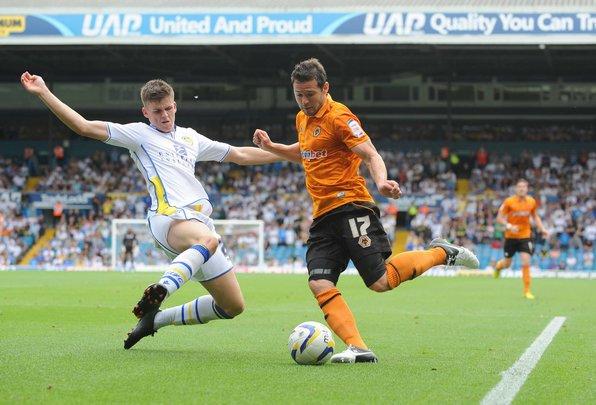 debuts.
debuts.
The identity of the potential buyers finally became apparent that afternoon.
Salem Patel and David Haigh, directors of Dubai-based investment company
GFH Capital, sat close to Ken Bates in the East Stand throughout.
No one denied that they were representatives of the interested party,
although there were some fanciful claims as to their true identities before
they were formally confirmed.
GFH Capital was a private equity firm wholly owned by the Bahrain investment
bank Gulf Finance House, an investor, adviser, and fund manager with a
'ten-year track record of top-performing investments and fund management'.
The bank had transformed its financial performance after losses of £450
million in 2009 and £215 million in 2010.
In 2011, the bank had made a profit of £235,000 on turnover close to
£43 million. In the six months to July 2012, there had been a profit of
more than £3.5 million on income of almost £20 million.
GFH had no record of involvement with football, but Haigh declared himself
a Leeds United supporter with family from Leeds.
back to top
Despite a winning start, United had a middling opening run. After three
victories from their opening seven fixtures, they sat eleventh.
The mood was lifted by success against Nottingham Forest on 22 September,
the 2-1 victory trumpeted in the Mail as 'their most impressive
win of the season'. Forest were the last unbeaten side left in the Championship.
Haigh, Patel and Hisham Al Rayes, the parent company's acting chief executive
officer, sat in the directors' box alongside Bates, who reported that
there were several technical points still to be addressed and that some
of the delays were due to summer holidays.
There had been talk about disagreements over indemnities, the protection
for a buyer against any liabilities becoming apparent after a sale was
finalised, and arguments over cash paid to the club by GFH Capital during
the summer. A United source claimed scheduled payments to the club had
been missed. A source at GFH countered by saying they were unwilling to
release any more money until final agreement on the transfer of Bates'
72.85% stake was reached.
Bates was confident that progress was being made and that GFH wanted
the deal concluded as soon as possible. He claimed that factors beyond
his control meant that United missed the August window, but they were
already planning for January.
United enjoyed a fantastic run in the Capital One Cup with some high-profile
victories over superior opponents, including Premier
League Everton on 25 September.
Albeit against vastly inferior opponents, Leeds had already scored seven
goals without reply in the competition, beating Shrewsbury 4-0 in the
first round before netting three against Oxford.
The Everton tie was staged on a stormy night in the West Riding and the
driving rain resulted in thousands of empty seats at kick off time, but
the players were greeted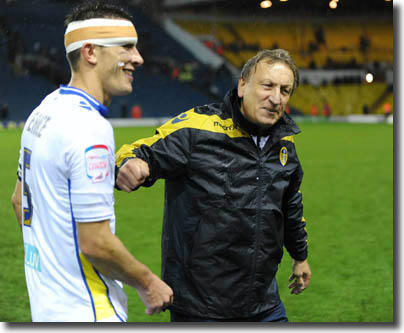 by the customary wall of sound as they came onto a pitch looking perfect
under the floodlights.
by the customary wall of sound as they came onto a pitch looking perfect
under the floodlights.
Warnock sent his team out well fired up and they were on the front foot
from the whistle, taking the lead within four minutes.
Everton sought to bring the ball out from the back, but Naismith's badly
misplaced pass allowed Austin to break up the play with a muscular challenge.
White latched on to the loose ball and surged through the heart of the
Everton defence. Reaching the edge of the 18-yard box, the Irishman eased
the ball onto his favoured left foot and coolly curled in an exquisite
strike. The ball sent the raindrops flying as it bulged the roof of the
net with the goalkeeper left flat-footed.
As the interval beckoned, Pearce emerged from a clash of heads with Naismith
with a nasty cut and a black eye. He played out the game with his head
enveloped by a large white bandage, his cheek coated in Vaseline in classic
'They shall not pass' style. Pearce, playing the game of his life, required
eight stitches at half-time to continue.
Nikica Jelavic was sent on for Naismith in the 65th minute, but the change
temporarily stayed the momentum that Everton had been building. David
Moyes' fears that it was not his night were amplified after 69 minutes
when United made it 2-0.
The Whites were awarded a free kick when Austin was fouled on the left
byline. A scratchy shot from Pugh bobbled through a crowd of players before
Austin flicked out his right foot to divert it past keeper and defenders
into the net. Cue more celebratory scenes as United scented victory.
With nine minutes remaining, the visitors seized a lifeline: Sylvain
Distin got up above Pearce on the six-yard line to nod the ball over Ashdown
and just under the bar.
It was all Everton as they pressed for a goal but United reacted manfully,
putting their bodies on the line to preserve their hard-won advantage.
back to top
There had been those that said Leeds didn't need the distraction of the
game and the attendance was well below capacity at 21,164, but the third
round tie made the club several hundred thousand pounds and that and the
feelgood memory made the evening worthwhile and Bates very, very content.
United were inspired by another influential performance from El-Hadji
Diouf, the controversial forward who had blossomed since arriving on a
short-term deal in August, and Warnock could not speak highly enough of
the former Liverpool and Bolton forward. He admitted that he knew next
to nothing about him in real terms before signing him and admitted regret
at somewhat rash historic remarks.
In January 2011, when QPR manager, Warnock accused Diouf of abusing Jamie
Mackie as he lay on the pitch with a broken leg during an FA Cup clash
with Blackburn. Warnock said, 'The lads were furious with El-Hadji Diouf;
[Mackie] had broken his leg and he is calling him all sorts on the pitch.
There was no need to put the finger up and call him a disgrace and even
the Blackburn people were embarrassed. I can't abide people like that,
I don't know why he wants to take on the world every week. For many years
I have thought he was the gutter type - I was going to call him a sewer
rat but that might be insulting to 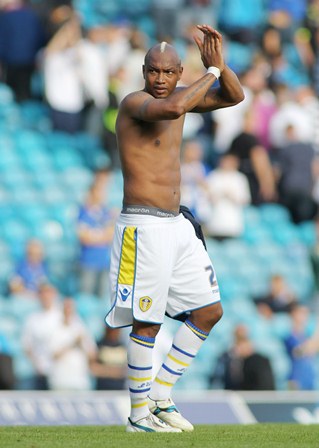 sewer
rats.'
sewer
rats.'
Diouf snapped back, 'Who is Warnock? He's nothing to me. He's not Alex
Ferguson, he's not Arsène Wenger, he's not Sam Allardyce or an important
manager. I know he doesn't like me, but it's the same for me too - I don't
like him.'
When paired at Leeds, however, Warnock treated Diouf as a long lost son.
Diouf was contracted to United until January but Warnock allayed concerns
that the 31-year-old's form might encourage other clubs to tempt him away.
United went on to beat another Premier League side, Southampton, in the
next round in a more one-sided affair, Leeds winning 3-0.
Reality set in when Chelsea inflicted a 5-1 defeat at Elland Road in
the last eight, but only after Becchio had given Leeds a lead which they
retained to the break.
A month earlier United had suffered an even heavier defeat, hammered
6-1 at home by Watford in the Championship but they remained in a comfortable
mid-table position.
Two days after the Everton victory, it was confirmed that GFH Capital
had signed an exclusive deal to acquire Leeds City Holdings, the parent
company of Leeds United.
A combined disclosure from Leeds and GFH offered precious little detail
that was not already known. There was no confirmation of whether Bates
was planning to sell his stake in full or whether he wanted to retain
an interest and nor was there a stated timescale. GFH's statement talked
of an 'acquisition' but went no further. It made a point of saying that
the commercial terms of the deal were still subject to a confidentiality
clause, though the club was understood to be valued at £52 million.
It was unclear whether GFH Capital were brokers for a consortium of investors
or were working on behalf of Gulf Finance House itself. GFH did not reveal
any real detail but went out of its way to justify the bank's involvement
to the Stock Exchange, emphasising United's large fanbase and the potential
rewards of promotion.
Phil Hay, after speaking to somebody with knowledge of GFH Capital's
operations, tweeted that his contact saw two options: that GFH Capital
either had rich backers, or planned to purchase the club with a view to
quickly selling it for a profit - 'flipping' it.
The ongoing presence of Haigh and his colleagues around Elland Road left
no doubt about the seriousness of their commitment. The question was whether
GFH Capital was the only show in town.
Several sources claimed that alternative offers had been made for the
club, but Bates scoffed at the suggestion in his programme notes, calling
it 'total rubbish'.
Despite all the reassurance, it would be another three months before
the deal was sealed and at the beginning of October, a prickly Bates cast
fresh doubt on the matter, complaining that GFH's lawyers were making
a real meal of a deal that was straightforward by anyone's standards.
Speculation grew that GFH Capital did not have the necessary cash to
complete the deal. According to the parent company's accounts, it held
only £3.6 million in cash, down from £804 million in 2008.
David Haigh sought to allay concerns, saying, 'The financials are the
parent company's not ours. All I can say is the money is available.' He
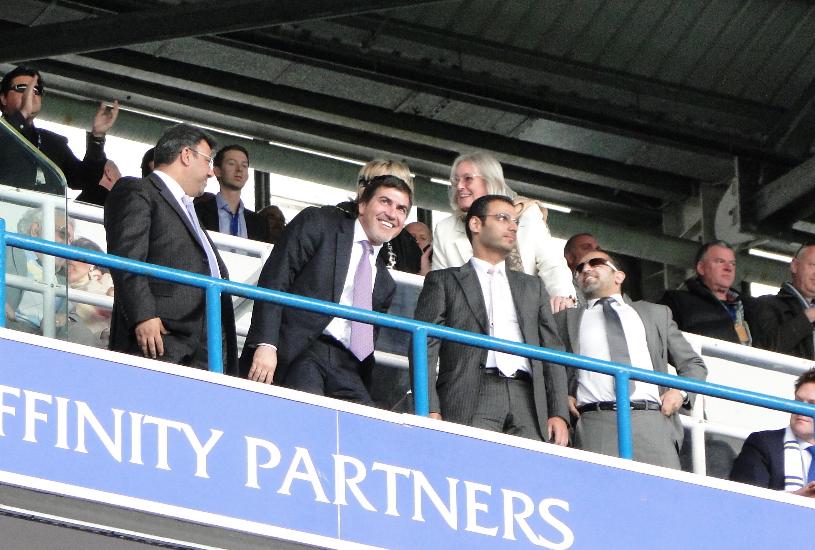 declined
to offer any detail because GFH was a listed entity, but said the bank
was very conservative, describing itself as 'an ethical bank'. In the
Middle East it was all about sovereign wealth and government-backed firms.
GFH had been affected by the financial downturn but not as badly as some.
declined
to offer any detail because GFH was a listed entity, but said the bank
was very conservative, describing itself as 'an ethical bank'. In the
Middle East it was all about sovereign wealth and government-backed firms.
GFH had been affected by the financial downturn but not as badly as some.
back to top
Haigh lauded Leeds as being in 'a fantastically unique position for all
sorts of factors', with 'fantastic existing management and administration
on and off the pitch'. With the right investment, GFH could build a sustainable
future. The club had to get the focus back on the football and 'ensuring
Premier League promotion with engaged, happy fans. We are long-term investors:
there is no two- or three-year exit plan.'
On 10 October, Leeds United and GFH Capital issued a joint statement
regarding the ongoing speculation, attempting to clarify the situation.
Haigh dismissed much of the gossip as 'a lot of nonsense' and that the
insider sources which had often been quoted had led to inaccurate and
misleading reports. He stressed the importance of talking to fans and
supporter groups but said that all parties had to respect the confidentiality
agreements. Haigh claimed that neither he nor any other employee had been
in discussion with LUST, citing as evidence a recent statement from LUST
which had claimed that GFH Capital 'has only emerged as potential buyers
in the last six weeks', while the bank had actually been working with
the club since June.
GFH Capital extended funding to the club, to support its immediate cash
flow needs, lending £2 million to Leeds City Holdings on 5 October by
way of a mortgage of shares. All shares in LUFC were used as collateral,
meaning that Bates could not sell LUFC until he repaid the £2 million,
effectively giving GFH control of the deal.
The Companies House documentation indicated that there was the potential
for even more funding to be advanced, referring to 'the sum of £2 million
plus any further amount made available by' GFH Capital. A 'source close
to the bidders' claimed that the total cash injection was nearer £6 million,
paid in to cover running costs and player transfers.
It was clear that Bates had been for some time paving the way to support
United's liquidity and lay the ground for his exit.
There was strong speculation that GFH Capital's exclusivity period would
end on 15 November, but a source from the bank said, 'The deal's moved
forward in GFH Capital's favour and the exclusivity agreement is almost
irrelevant now. It's really gone too far for that to be an issue. We're
at the stage where both sides are moving towards a final agreement.'
On 16 November it was reported that the exclusivity period had been extended,
'merely to ensure we can get past the final post without distraction'.
GFH Capital's offer was said to be for £17 million, to be paid in four
instalments, with additional payments if the club reached the Premier
League.
back to top
'We have discussed a price and a structure for the club post-investment,'
said a source close to the deal. 'We have been through the books, shown
proof of funds, and all the necessary documentation is with Ken Bates.
The money to complete the deal is in an account ready to go.'
GFH believed that Leeds was a fantastic opportunity, a club that was
significantly undervalued and only required minor tweaks to make a big
difference. There was phenomenal potential, not only on the business side,
but also as a community enterprise. One of the things the firm had done
from day one was set out to reintegrate the community. Haigh said that
'People in Leeds felt like the club wasn't theirs any more, so we started
a campaign of giving the club back to them. We did little things like
ensuring social media was up and running. When we took over the club,
they didn't even have things like Twitter and Facebook accounts.'
Haigh felt that every kid in town should be wearing a Leeds shirt, but
in the city centre he had counted more shirts of other clubs than Leeds
shirts. 'There's a lost generation of Leeds United fans, so we had to
change that.'
Finally, on 21 November, the United website confirmed the long-awaited
news that contracts had been signed, sealed, 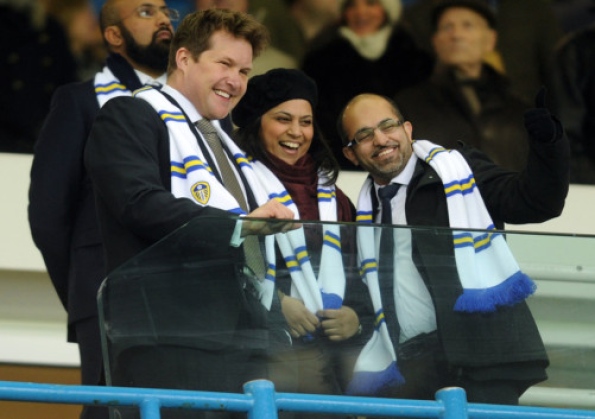 and
exchanged. There would be a one-month transitional period to allow for
full change in ownership and, following Football League approval, GFH
Capital Limited would become 100% shareholders.
and
exchanged. There would be a one-month transitional period to allow for
full change in ownership and, following Football League approval, GFH
Capital Limited would become 100% shareholders.
The joint statement confirmed that GFH Capital Limited had financially
supported the club since the start of the exclusivity period and would
make further funds available for working capital and transfers. It also
indicated that Haigh would join the club board with immediate effect with
Al Rayes and Patel to follow in December.
While bemoaning the length of time the deal had taken to finalise, Bates
commented that the delay had given GFH the opportunity to see the strengths
and weaknesses and that there would be a smoother transition than seen
at a lot of clubs.
'A brief but important transitional period now begins in terms of the
changeover of ownership', declared Haigh, in hushed, state of the nation
style. He confirmed that GFH had that day injected further funds into
the club and 'Let's now march on together, taking the club back to the
Premier League as soon as possible.'
But there was a sting in the tale that caused some raised eyebrows. Bates
was to remain as chairman for a transition period until the end of the
season after which he would become club president.
Leeds supporters were relieved to see the deal completed but enraged
by the revelation of Bates' ongoing involvement.
GFH Capital had wanted a clean break but they relented to Bates' insistence
on a continuing presence. A source in the bank admitted that the compromise
over Bates' position was 'fundamental' to ensuring that its takeover went
through. There were other investment options available to Bates and he
had clearly played hard ball.
back to top
Gary Cooper echoed the concerns. 'Why the continued involvement with
Ken Bates? We're not questioning the transitional period at all, that
makes absolute sense. But my members are already asking me, why does the
club need or want Ken Bates as president. His tenure at the club has not
been one of success. He's like Marmite, you either love him or loathe
him and he's proved very divisive at this club. He's done his best to
discredit supporters' groups, he's called fans morons and dissidents,
and he's sold all our best players. He's a hell of a character, but he's
done nothing to endear himself to the supporters of Leeds United. GFH
Capital now have the unenviable task of rebuilding the club's relationship
with the fans when appearing to be hand-in-hand with Ken Bates.'
Warnock used the additional funds made available to bring in Swansea
centre-back Alan Tate and West Brom wide man Jerome 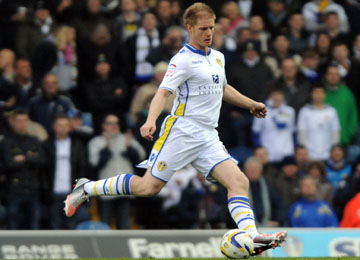 Thomas
before the emergency loan window closed on 22 November. It was expected
that the deals would be made permanent when the transfer window opened
in January.
Thomas
before the emergency loan window closed on 22 November. It was expected
that the deals would be made permanent when the transfer window opened
in January.
Both players featured when United ended the 14-game unbeaten run of Championship
leaders Crystal Palace on 24 November, Leeds' first victory since 6 October,
which saw them climb to sixteenth, eight points clear of the drop zone.
Haigh and Patel were on hand to witness a promising start to a new era.
When United won four of the following five games, they suddenly found
themselves eighth, two points off a Play-Off spot and just nine away from
the automatic promotion places.
On 10 December, the Football League approved the appointment of Al Rayes
and Patel to join Haigh as directors of Leeds. Haigh was added to the
board on 20 November and the other two would become directors before the
end of the month after passing the League's Owners and Directors Test.
The League was analysing the fine details of the takeover and completion
of the buyout was dependent on the body's full approval, though this was
a formality expected to be completed prior to the agreed date of the transaction.
There were some concerns when a scheduled payment date was missed, but
the club was confident that the £52 million sale would be finalised as
planned. They had been reassured that the money was in GFH Capital's lawyer's
client account and Bahrain banking regulations meant the payment schedule
had to be altered.
It was almost an anti-climax when the takeover was formally confirmed
as expected at 20:40 GMT on Thursday, 20 December, seven months after
the TOMA story began.
Part 2 Brave new dawn - Results,
table and transfers














 sink
in. And we were away …
sink
in. And we were away … Specialists
saw the delay as exceptionally long, according to Hay, who added that
'this deal has strayed into the realms of the ridiculous and was heading
that way for several weeks, not helped by the confidentiality agreement
which smothers the full story.'
Specialists
saw the delay as exceptionally long, according to Hay, who added that
'this deal has strayed into the realms of the ridiculous and was heading
that way for several weeks, not helped by the confidentiality agreement
which smothers the full story.' debuts.
debuts. by the customary wall of sound as they came onto a pitch looking perfect
under the floodlights.
by the customary wall of sound as they came onto a pitch looking perfect
under the floodlights. sewer
rats.'
sewer
rats.' declined
to offer any detail because GFH was a listed entity, but said the bank
was very conservative, describing itself as 'an ethical bank'. In the
Middle East it was all about sovereign wealth and government-backed firms.
GFH had been affected by the financial downturn but not as badly as some.
declined
to offer any detail because GFH was a listed entity, but said the bank
was very conservative, describing itself as 'an ethical bank'. In the
Middle East it was all about sovereign wealth and government-backed firms.
GFH had been affected by the financial downturn but not as badly as some. and
exchanged. There would be a one-month transitional period to allow for
full change in ownership and, following Football League approval, GFH
Capital Limited would become 100% shareholders.
and
exchanged. There would be a one-month transitional period to allow for
full change in ownership and, following Football League approval, GFH
Capital Limited would become 100% shareholders. Thomas
before the emergency loan window closed on 22 November. It was expected
that the deals would be made permanent when the transfer window opened
in January.
Thomas
before the emergency loan window closed on 22 November. It was expected
that the deals would be made permanent when the transfer window opened
in January.